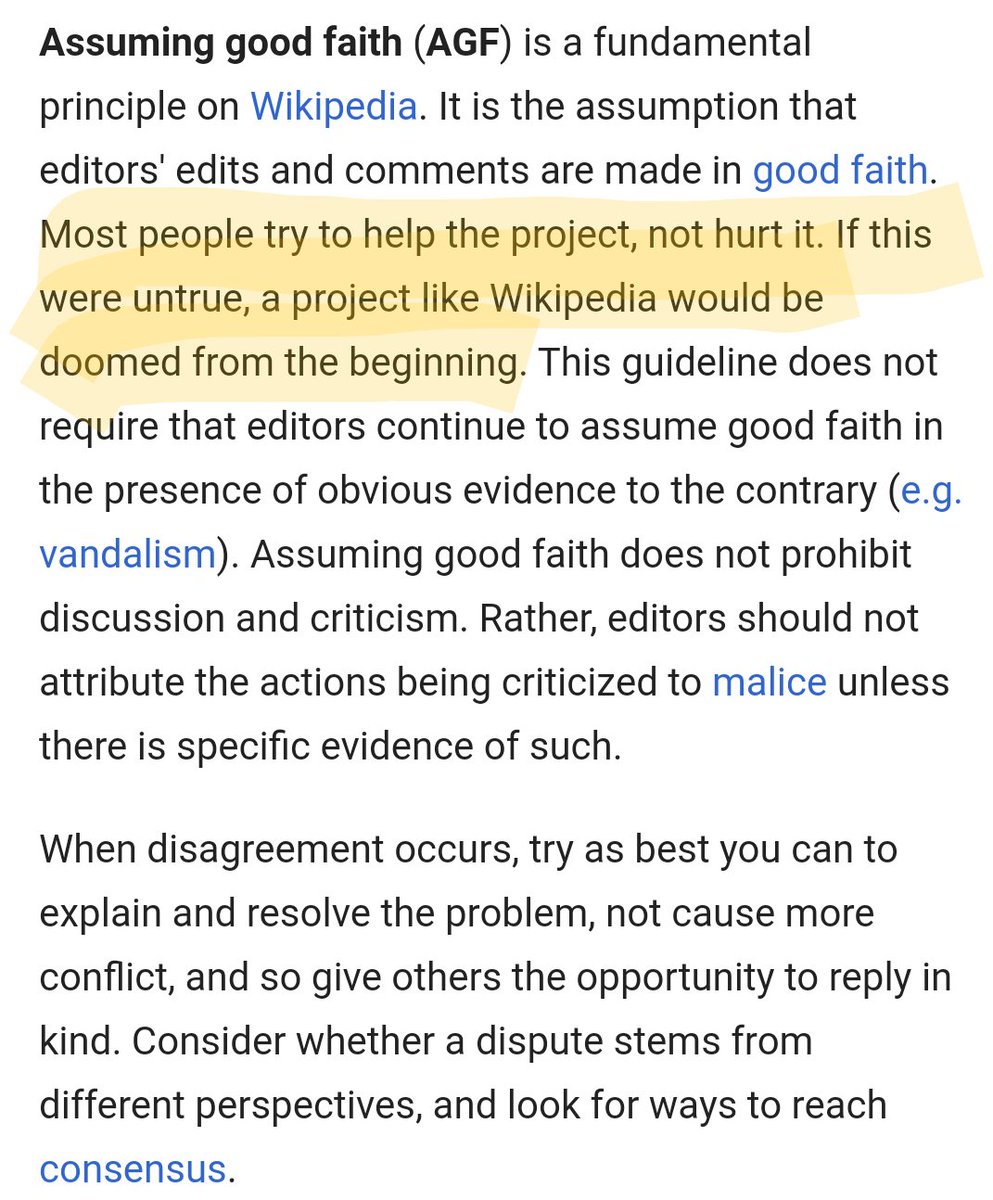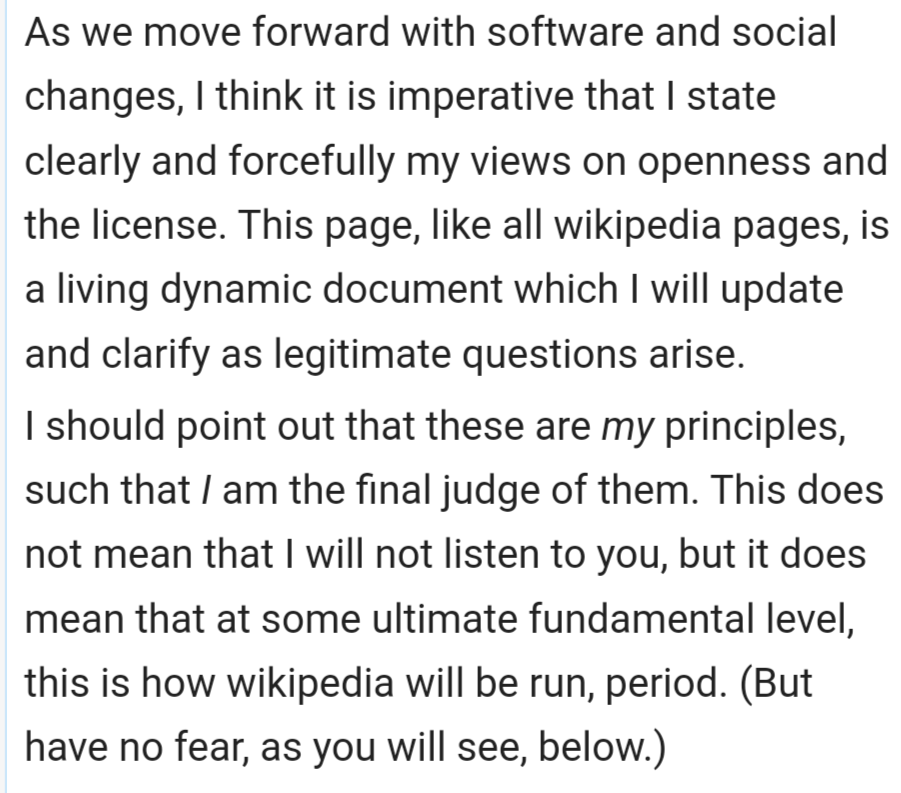Wikipedia is such an interesting case study on how to build a productive community.
It is a public space. A lot of thought has gone into the design of the systems, software, and culture that makes it what it is.
It is a public space. A lot of thought has gone into the design of the systems, software, and culture that makes it what it is.
It is weird that in school we weren't allowed to cite one of the most reliable sources around: Wikipedia.
Have a look at this Wikipedia article on the reliability of Wikipedia: https://en.m.wikipedia.org/wiki/Reliability_of_Wikipedia. Which other site will give you such a balanced view of its own reliability?
Have a look at this Wikipedia article on the reliability of Wikipedia: https://en.m.wikipedia.org/wiki/Reliability_of_Wikipedia. Which other site will give you such a balanced view of its own reliability?
Lack of funding initially:
Jimmy Wales (founder) says that their lack of funding early on meant that they couldn't hire anyone, so they were forced to build a community of volunteers and figure out how to crowdsource editorial decisions.
Jimmy Wales (founder) says that their lack of funding early on meant that they couldn't hire anyone, so they were forced to build a community of volunteers and figure out how to crowdsource editorial decisions.
Assuming good faith is a fundamental principle at Wikipedia https://en.wikipedia.org/wiki/Wikipedia:Assume_good_faith
Design of the internal pages:
Jimmy Wales: Wikipedia's comment pages are designed to be editable just like Wiki pages. If someone posts an inflammatory comment, someone else will delete it and explain why. And the act of deleting is a public as well.
Jimmy Wales: Wikipedia's comment pages are designed to be editable just like Wiki pages. If someone posts an inflammatory comment, someone else will delete it and explain why. And the act of deleting is a public as well.
How is Wikipedia governed?
Jimmy: People get elected to be administrators. Administrators have powers to block people or temporarily lock entries. Everything that an administrator does is publicly visible. You can't block someone just because you're having an argument.
Jimmy: People get elected to be administrators. Administrators have powers to block people or temporarily lock entries. Everything that an administrator does is publicly visible. You can't block someone just because you're having an argument.
An arbitration committee handles the longer term intractable disputes. If people can't figure out what to do, then the arbitration committee will hear a case regarding what to do on this entry. They can impose binding solutions like a topic ban for 10 people on both sides.
"Wikipedia is not a democracy. A simple vote doesn't always carry the day. There are certain principles about improving the quality of the encyclopedia."
On vandalism:
Jimmy: Many Wikipedia editors, when asked how they started, say "oh I was a vandal. I vandalized a page and then people were nice to me; I thought that wasn't fun, so I thought I would just edit Wikipedia."
Jimmy: Many Wikipedia editors, when asked how they started, say "oh I was a vandal. I vandalized a page and then people were nice to me; I thought that wasn't fun, so I thought I would just edit Wikipedia."
There are also anti-vandal bots on Wikipedia like this one: https://en.wikipedia.org/wiki/User:ClueBot_NG
How do random people arrive at "truth"?
Jimmy: "I always invite people to imagine a very kind and thoughtful Catholic priest and a kind and thoughtful Planned Parenthood activist, and they're working together on an entry on abortion."
Jimmy: "I always invite people to imagine a very kind and thoughtful Catholic priest and a kind and thoughtful Planned Parenthood activist, and they're working together on an entry on abortion."
"They are clearly never going to agree. Yet they can both agree to say 'let's present this fairly'. The priest will understand that Wikipedia can't say 'abortion is a sin' but it can say that the Catholic position on abortion is that it's a sin."
Give me a more fair overview of the abortion debate in the US than this: https://en.wikipedia.org/wiki/Abortion_in_the_United_States
Why doesn't Wikipedia run ads?
Jimmy: Because if you're reading about Queen Victoria, there's probably very little to sell to you and the ad rates are poor. If you're reading about Tesla cars or vacations in Las Vegas, it would be different.
Jimmy: Because if you're reading about Queen Victoria, there's probably very little to sell to you and the ad rates are poor. If you're reading about Tesla cars or vacations in Las Vegas, it would be different.
Jimmy: "We'd have an incentive to create content to drive higher ad revenues, which isn't what we want to do. We are an encyclopedia."
Jimmy comes across as a benevolent dictator. Here is his original statement of principles in October 2001: https://en.wikipedia.org/w/index.php?oldid=409315229
Jimmy on his role:
"A component of the success of Wikipedia is that I'm a friendly and nice person. I'm very laid back. So I was able to work in a community environment where people basically yell at you and you just have to roll with it."
"A component of the success of Wikipedia is that I'm a friendly and nice person. I'm very laid back. So I was able to work in a community environment where people basically yell at you and you just have to roll with it."
"You're in some sense a leader, but you can't tell anyone what to do - they're volunteers, so you have to work with love and reason to move people along in a useful way."
Stats on Wikipedia contributors:
~75k people contribute to Wikipedia every month: they make at least 5 edits
3-5k people are the "core community": they make 100+ edits a month
Here are the top 10 contributors by # of edits:
~75k people contribute to Wikipedia every month: they make at least 5 edits
3-5k people are the "core community": they make 100+ edits a month
Here are the top 10 contributors by # of edits:
Wikipedia is written by thousands of people, but it seems like it is written by the same person. https://twitter.com/HelloShreyas/status/1232529111555461120
Why do people contribute?
Mission: "free access to the sum of human knowledge" is meaningful to people
It's fun: you get to meet people who are interested in what you're interested in
Culture: no personal attacks, no debates on topics - just a focus on improving the article
Mission: "free access to the sum of human knowledge" is meaningful to people
It's fun: you get to meet people who are interested in what you're interested in
Culture: no personal attacks, no debates on topics - just a focus on improving the article
Jimmy's quotes are from his podcast episodes with Krista Tippett and Guy Raz
https://onbeing.org/programs/jimmy-wales-the-sum-of-all-human-knowledge-2/ https://www.npr.org/2020/01/24/799257340/wikipedia-jimmy-wales-2018
https://onbeing.org/programs/jimmy-wales-the-sum-of-all-human-knowledge-2/ https://www.npr.org/2020/01/24/799257340/wikipedia-jimmy-wales-2018

 Read on Twitter
Read on Twitter







